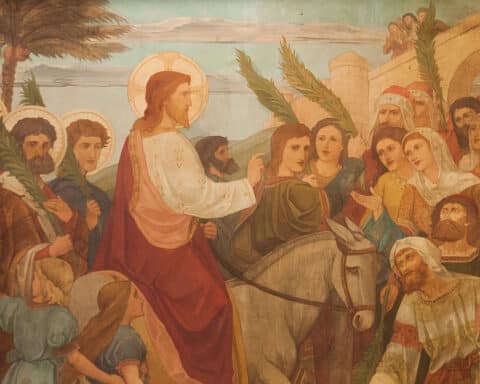
This idolatry of the family is grounded in the first sin of Adam and Eve in Eden. Eve, tricked by the serpent, seizes the fruit of the knowledge of good and evil. She believes the serpent that God is stingy, holding back the fullness of divine life from creation. Adam’s sin is worse. On his own volition, he eats the fruit given to him by Eve.
There is no serpent.
The internal dialogue of Adam is not given in the text of Genesis, so we must ask questions of the text. Why doesn’t Adam believe in the possibility of divine mercy? Why can’t he imagine that God could forgive them?
Adam eats and then hides because he can’t believe in the goodness of God.
Worse yet, Adam blames: “‘The woman whom you put here with me — she gave me fruit from the tree, and so I ate it'” (Gn 3:12).
| 10th Sunday in Ordinary Time – June 10, 2018 |
|---|
|
GN 3:9-15
PS 130:1-2, 3-4, 5-6, 7-8
2 COR 4:13-5:1
MK 3:20-35
|
Adam, who once exclaimed that Eve was bone of his bone, flesh of his flesh, fractures communion. He blames God for creating Eve. He blames Eve for being created.
The fall is the breaking off of original unity, of the possibility of love unto the end.
Or so we thought. In today’s Gospel, we hear from Jesus about the source of this disunity — the devil! Satan is the father of lies, the great destroyer of unity who introduces suspicion and hatred into the human family.
Accused by his opponents of being possessed by Satan, Jesus objects that it is impossible. He has come to restore unity, not to destroy it: “‘How can Satan drive out Satan? If a kingdom is divided against itself, that kingdom cannot stand” (Mk 3:23-24).
Jesus’ comments about family must be read in light of his mission to restore harmony to creation. The crowd tells Jesus that his family is outside.
The logic of kinship would necessitate that Jesus interrupt his discourse and attend to his family. He doesn’t.
He instead expands the kinship of the divine kingdom, noting, “‘Here are my mother and my brothers. For whoever does the will of God is my brother and sister and mother'” (Mk 3:34-35). Reading this, it would be wrong for me, a husband and father, to deny the familial responsibilities that I have. But, it’s equally wrong to treat my family as an idol. To let the kinship that binds us together create an “us” versus “them.” My kids. My wife. Mine.
For the language of mine fractures communion. It’s not “us” versus “them.” Rather, all the nations are to do the will of God, entering into God’s own kinship.
Pope Francis in Amoris Laetitia describes that the family has a very particular mission. The goal is not to become a self-enclosed unit apart from society. The family, full of the love of the Spirit, is to build up the communion of society.
The natural relationship between husband and wife, brother and sister, parent and child has returned to its original destiny. This relationship is not mere kinship, but is most fully lived out when the family does the will of God rather than its own.
Then, the family becomes an icon of love rather than an idol of self-satisfaction.
Timothy P. O’Malley, Ph.D., is managing director of the McGrath Institute for Church Life.





